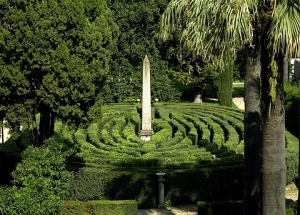The daughters of the King of Bavaria at this time included Elizabeth who became the Queen of Austria, and Maria Sophie (October 4,1841 to January 19, 1925) who became the Queen of the Kingdom of the Two Sicilies.
A revolutionary wave swept through Europe in 1848, and this is part of our story. The tumult then was a lot like the recent "Arab Spring" and lasted beyond the marriage of Maria Sophie in 1859. The difference mainly being that enough time has elapsed since 1848 that historians can get away with pretending they understand what happened. Maria Sophie's husband, King Francis II, had been called a "bookish heir" before his father died. And shortly thereafter King Francis and Queen Maria Sophie were driven into exile by the revolutionary fervor, and were being sheltered by the Roman principality (a dwindled Papal estate.)
Their life in exile is described in a book Monarchy and Exile: The Politics of Legitimacy from Marie de Médicis to Wilhelm II, edited by Philip Mansel, Torsten Riotte (2011), in these words:
...Life was difficult as republican and Savoyard sympathizers in Rome often made the royal couples appearances uncomfortable.... The royal couple's social life was largely limited to the circle of loyal nobles and retainers who had accompanied them into exile, to religious ceremonies, and the occasional formal entertainment provided by other exiled royals. The number of diplomats accredited to the King who had accompanied him into exile was gradually reduced as more and more countries recognised the new Italian state.....
Britain's government of course did not have the monarchical powers that the rulers in exile had had, and little sympathy in the English press was extended to the royalists cast out of their homes at this time. We read from the same source as above:
The London Times in 1861 accused the Queen [Maria Sophie] of shooting dead a cat in the Quirinale garden, an act guaranteed to offend its English readers and provoking a further outburst by Lord Palmerston against the Neapolitan legitimists.
A footnote explicates: "The Queen and her sisters, the Empress Elizabeth and Countess of Trappani had an intense dislike of cats." The government in exile of The Kingdom of the Two Sicilies was not in Rome long, and the deposed royals lived various places. Maria Sophie outlived her husband by 30 years and died in Munich.
Here is part of the contemporary Quirinale garden.

No comments:
Post a Comment